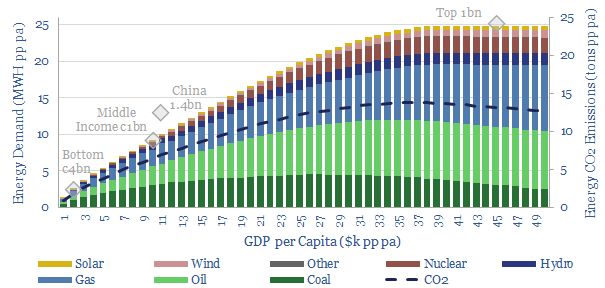Deepening energy shortages in 2022-30 could devastate low-income countries, geopolitically isolate the West, and de-rail decarbonization. This 13-page note evaluates the linkage between energy consumption and income over the past half century and quantifies what a ‘just transition’ would look like.
The reason for this research note is that we see energy shortages deepening throughout the 2020s. This suggests someone will need to curtail energy use. What if the answer is low-income consumers in low-income countries? (pages 2-3).
Key trends from 50-years of global economic development are drawn out on pages 4-6, after tabulating 60,000 data-points, across 25 key countries and regions. The depressing conclusion is around 10x ‘energy inequality’ between the top 1bn and the bottom 4bn.
Our analysis on energy shortages in low income countries most likely under-states the degree of energy use inequality, for methodological reasons, discussed on page 7.
What is a ‘just transition’? Our answer is laid out on pages 8-9, finding a balance between economic development and energy usage.
Constructive options. The biggest bottleneck for a just ‘energy transition’, clearly, definitively, is a lack of energy investment, especially renewables and natural gas. Shortly followed by greater efficiency initiatives in the West (pages 10-11).
Our conclusions and questions over the future of world economic development amidst the energy transition are laid out on pages 12-13.
To read about some of our ideas on how to cure emerging energy shortages in the gas and power sectors, please see our article here.
